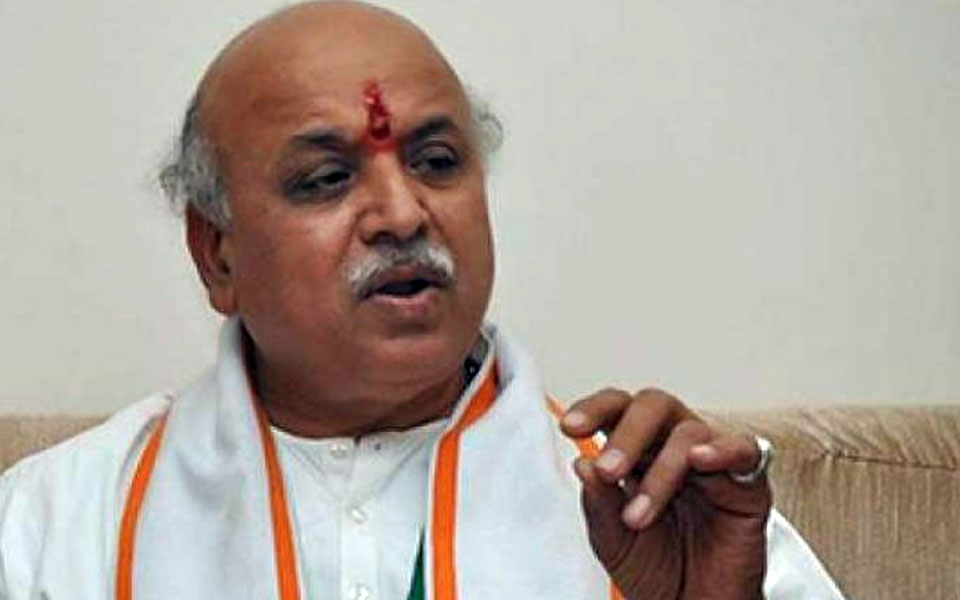Nagpur, Oct 7: Former Vishwa Hindu Parishad leader Pravin Togadia Sunday hit out at Prime Minister Narendra Modi and RSS chief Mohan Bhagwat accusing them of not fulfilling the promise of building Ram Temple in Ayodhya.
Togadia also slammed Bhagwat for stating that "Hindu Rashtra does not mean there is no place for Muslims". Bhagwat had made the statement at the Rashtriya Swayamsevak Sangh's three-day lecture series in September this year.
"Hindu Rashtra doesn't mean there's no place for Muslims. The day it is said so, it won't be Hindutva any more. Hindutva talks about Vasudhaiva Kutumbakam," Bhagwat had said.
Addressing a press conference here Sunday, Togadia said, "I want to ask if there is no Hindutva without gau hatyaare (cow killers), love jihadis, stone pelters and Pakistani flag wavers in Kashmir."
"We had joined the RSS 52 years ago considering it to be a Hindu organisation. But now we feel it is only concerned with the interests of Muslim community," Togadia added.
The former VHP leader alleged that the RSS was not interested in pursuing the cause of building a Ram Temple in Ayodhya.
He said that instead of demanding a temple be constructed, the RSS chief should "order" Prime Minister Narendra Modi to get the government to enact a law in Parliament to pave the way for a Ram Temple.
He also accused PM Modi of "appeasing" Muslim community and going back on the promise to build a Ram Temple in Ayodhya.
"When it comes to the SC/ST Act, Modi says Parliament will decide on the matter and not the courts. But when it comes to building the Ram Temple, Modi backtracks and says the courts will decide on the issue and not Parliament," Togadia said.
He charged Modi with forsaking the ideology of the BJP as well as that of Hindutva.
Speaking about the Antarrashtriya Hindu Parishad (AHP), an outfit he formed after quitting the VHP, Togadia said the organisation would pursue "Hindu politics".
When asked whether AHP will support the Shiv Sena in the elections, Togadia said, "If (Sena chief) Uddhav Thackeray pursues the saffron flag (Hindutva politics), we will support him."
Togadia had quit the VHP on April 14 this year after former Himachal Pradesh governor V S Kokje defeated his nominee Raghav Reddy in an election for the post of VHP International president.
Let the Truth be known. If you read VB and like VB, please be a VB Supporter and Help us deliver the Truth to one and all.
Panaji (PTI): As part of a crackdown against tourist establishments violating laws and safety norms in the aftermath of the Arpora fire tragedy, Goa authorities on Saturday sealed a renowned club at Vagator and revoked the fire department NOC of another club.
Cafe CO2 Goa, located on a cliff overlooking the Arabian Sea at Vagator beach in North Goa, was sealed. The move came two days after Goya Club, also in Vagator, was shut down for alleged violations of rules.
Elsewhere, campaigning for local body polls, AAP leader Arvind Kejriwal said the fire incident at Birch by Romeo Lane nightclub at Arpora, which claimed 25 lives on December 6, happened because the BJP government in the state was corrupt.
An inspection of Cafe CO2 Goa by a state government-appointed team revealed that the establishment, with a seating capacity of 250, did not possess a no-objection certificate (NOC) of the Fire and Emergency Services Department. The club, which sits atop Ozrant Cliff, also did not have structural stability, the team found.
The Fire and Emergency Services on Saturday also revoked the NOC issued to Diaz Pool Club and Bar at Anjuna as the fire extinguishers installed in the establishment were found to be inadequate, said divisional fire officer Shripad Gawas.
A notice was issued to Nitin Wadhwa, the partner of the club, he said in the order.
Campaigning at Chimbel village near Panaji in support of his party's Zilla Panchayat election candidate, Aam Aadmi Party leader Kejriwal said the nightclub fire at Arpora happened because of the "corruption of the Pramod Sawant-led state government."
"Why this fire incident happened? I read in the newspapers that the nightclub had no occupancy certificate, no building licence, no excise licence, no construction licence or trade licence. The entire club was illegal but still it was going on," he said.
"How could it go on? Couldn't Pramod Sawant or anyone else see it? I was told that hafta (bribe) was being paid," the former Delhi chief minister said.
A person can not work without bribing officials in the coastal state, Kejriwal said, alleging that officers, MLAs and even ministers are accepting bribes.





